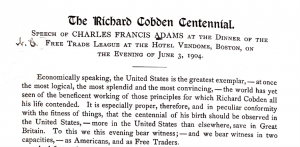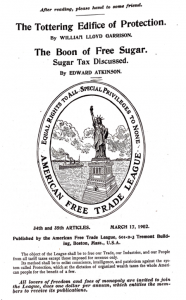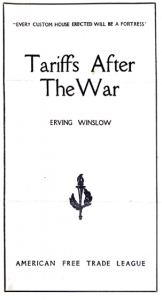By Marc-William Palen, University of Exeter, MHS-NEH Long-term Research Fellow
On the evening of 3 June 1904, the opulent Hotel Vendome in Boston’s Back Bay hosted a now-forgotten gala. The members of the American Free Trade League were celebrating the centenary of the birth of Richard Cobden. As the diners finished their meals, Charles Francis Adams, Jr. (1835-1915), took to the podium. The great-grandson of John Adams, the grandson of John Quincy Adams, and the president of the Massachusetts Historical Society proclaimed that “as Americans,—citizens of the United States,—to Richard Cobden we owe a debt of political gratitude than which we owe none greater to any European. . . . I am here also as a Free-trader; one who believes in the economic dispensation of Adam Smith, as developed by Richard Cobden.”

Now you might be asking yourself who was this Richard Cobden character? And why were Boston’s leading liberal lights like Charles Francis Adams, Jr. singing his praises at the turn of the twentieth century?
The name of Richard Cobden (1804-1865) is now largely a forgotten one in American history. Briefly, he started a radical free-trade movement in Britain in the 1830s and 1840s that had long-lasting repercussions for Britain and the world. He helped overturn Britain’s Corn Laws–high tariffs on foreign grain—ushering in nearly a century of the island nation’s adherence to the ideology of free trade. Cobden was a Liberal radical, a staunch opponent of British imperialism, an antislavery advocate, and a leader of the mid-century international peace movement. Cobden and his disciples believed that protectionism was a policy designed to prop up the aristocratic landed elite at the expense of the British workingman; high tariffs also led to trade wars, and trade wars to military conflict. Free trade instead promised democratization by undermining the power of the aristocrats; cheap food to Britain’s poorest; and friendlier relations with Britain’s trading partners.
In other words, when Cobden was alive, and when Charles Francis Adams, Jr. was giving his homage forty years after Cobden’s death, free trade was an important ideology of transatlantic leftwing radicalism. This ideology went by a variety of names at the time. One was the “Manchester School” owing to the ideological movement’s home base of Manchester, England. The other was, of course, “Cobdenism.”
Cobdenism’s importance has been ably traced within British history.[1] But what about Cobdenism’s radical influence within American history? As it turns out, beyond Britain, this free-trade ideology had its most numerous disciples within the United States, who set their sights on turning the protectionist nation into a free-trade nation like Britain.[2]
To understand this, we need to look to Massachusetts’s leftwing radical past.
The first American subscribers to Cobdenism were among the most radical abolitionists. Freeing trade was, for them, the next logical step after ending slavery on the road to emancipating mankind.
Reverend Joshua Leavitt deserves due credit, and ably highlights the radical confluence of the antislavery and free-trade movements. The Massachusetts-born Congregationalist minister, founder of the antislavery Liberty Party, and editor of the abolitionist periodical Emancipator sought a resolution at London’s 1840 World Anti-Slavery Convention condemning the Corn Laws. Their repeal, he argued, would enable Britain to import free-grown wheat from the American northwest rather than slave-grown cotton and tobacco from the south. In 1842, Leavitt next went to the US Congress to lobby for them to pressure the British to repeal the Corn Laws. He brought a similar case to the 1843 London antislavery convention, before undertaking a free-trade lecture tour with Richard Cobden. Upon returning to the United States, Leavitt founded anti-Corn Law organizations across the American northeast and west to keep up the grassroots pressure and as a sign of solidarity with his British free-trade allies.[3]
Leavitt would thereafter become one of the first honorary (non-due paying) members of London’s Cobden Club upon its creation in 1866, a year after Cobden’s death. Its motto was “Free Trade, Peace, and Goodwill Among Nations.” Other early US Cobden Club members included Boston abolitionist firebrand William Lloyd Garrison, Boston transcendentalist Ralph Waldo Emerson, Massachusetts Senator Charles Sumner, Boston economist Edward Atkinson, as well as various members of the Adams family, including Charles Francis Adams, Sr., Henry Adams, and Charles Francis Adams, Jr.
After the Civil War and the end of US slavery, the Republican Party rebranded itself as the party of protectionism and imperial expansion.[4] As a result, the GOP became the main target for many of these same Massachusetts radicals, who became leaders of the late nineteenth-century free-trade, peace, and anti-imperialist movements. For them, as for Cobden, these were all one and the same cause.
A new generation of even more radical Massachusetts free traders joined the fray at the turn of the century under the auspices of the Anti-Imperialist League (AIL), which was most active in Chicago and Boston. The AIL was created in 1898 in opposition to the US war with Spain during the Republican presidency of William McKinley, “the Napoleon of Protection.” The AIL’s officers were predominantly American Cobdenites, many of whom would go on to spearhead the peace movement during the First World War.[5]

As Boston AIL officer Erving Winslow put it at the outset of the Great War in his pamphlet Tariffs After the War, “there is one simple and solid foundation for world harmony . . . the foundation of economic peace, a firm and straightforward movement towards free trade.”

The leftwing leaders of the US free-trade movement, many of them from Massachusetts, counted among the most pro-active actors within the US peace and anti-imperial movement. After 1898, these included William Lloyd Garrison’s children—William Lloyd Garrison Jr. and Fanny Garrison Villard—as well as Morefield Storey, AIL president, and Erving Winslow, AIL secretary, both of whose papers are held at the Massachusetts Historical Society. Fanny Garrison Villard would go on to co-found the Women’s Peace Society in 1919. Its motto was “Immediate and universal disarmament. Abolition of mob violence. Free trade, the world over.” Another Garrison child, Frank Garrison, would become the president of the Boston-based International Free Trade League upon its founding in 1918, a radical leftwing peace organization dedicated to undermining protectionism in the United States and across the globe.
Massachusetts’s leftwing free-traders—its Cobdenites—thus played a central part within the late-nineteenth and early-twentieth-century US peace and anti-imperialist movements. And this was the radical backdrop Charles Francis Adams, Jr.’s forgotten speech in Boston’s Back Bay in early June 1904.
[1] See, especially, Anthony Howe, Free Trade and Liberal England, 1846-1946 (Oxford: Clarendon, 1998); Peter Cain, “Capitalism, War and Internationalism in the Thought of Richard Cobden,” British Journal of International Studies 5 (Oct. 1979): 229-247; Anthony Howe, “Radicalism, Free Trade, and Foreign Policy in Mid-Nineteenth-Century Britain,” in William Mulligan and Brendan Simms, eds., The Primacy of Foreign Policy in British History, 1660-2000 (London, 2010): 167-180; Oliver MacDonagh, “The Anti-Imperialism of Free Trade,” Economic History Review 14 (April 1962) 489-501; Anthony Howe and Simon Morgan, ed., Rethinking Nineteenth Century Liberalism: Richard Cobden Bicentenary Essays (London: Routledge, 2006); Frank Trentmann, Free Trade Nation (Oxford: Oxford University Press, 2008).
[2] Marc-William Palen, The “Conspiracy” of Free Trade: The Anglo-American Struggle over Empire and Economic Globalisation, c. 1846-1896 (Cambridge: Cambridge University Press, 2016).
[3] Palen, The “Conspiracy” of Free Trade, 16-19; Marc-William Palen, “Free-Trade Ideology and Transatlantic Abolitionism: A Historiography,” Journal of the History of Economic Thought 37 (June 2015): 291-304.
[4] Marc-William Palen, “The Imperialism of Economic Nationalism, 1890-1913,” Diplomatic History 39 (Jan. 2015): 157-185.
[5] Marc-William Palen, “Transimperial Roots of American Anti-Imperialism: The Transatlantic Radicalism of Free Trade, 1846-1920,” in Jay Sexton and Kristin Hoganson, eds., Crossing Empires: Taking U.S. History into Transimperial Terrain (Duke University Press, 2020): 159-182.

